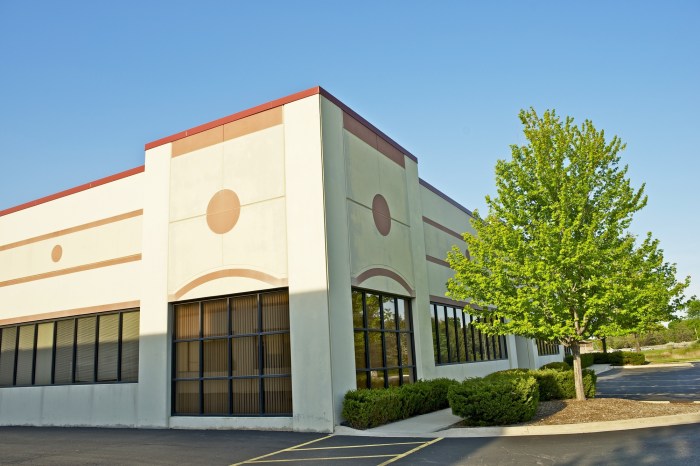Diving into the realm of buying commercial property, this introduction sets the stage for an insightful exploration of essential factors, types of properties, financing options, due diligence processes, and negotiation strategies. The journey ahead promises to be enlightening and informative, shedding light on the intricacies of investing in the commercial real estate market.
Factors to Consider Before Buying Commercial Property

Before making the decision to purchase commercial property, there are several key factors that need to be carefully considered to ensure a successful investment.
Location
- Location plays a crucial role in the success of a commercial property investment. Consider factors such as proximity to transportation hubs, target market demographics, and overall accessibility.
- Choosing a prime location can significantly impact the property's potential for high rental income and property value appreciation over time.
Property Type
- Determine the type of commercial property that aligns with your investment goals. Options include office buildings, retail spaces, industrial warehouses, or mixed-use developments.
- Each property type comes with its own set of challenges and opportunities, so it's essential to choose one that fits your risk tolerance and investment strategy.
Budget
- Establish a clear budget that takes into account not just the purchase price of the property, but also additional costs such as maintenance, renovations, and property taxes.
- Ensure that the property's potential income aligns with your financial goals and that you have the financial capacity to weather any unexpected expenses.
Potential for Growth
- Research the economic trends and development plans in the area where the property is located to gauge its potential for future growth and appreciation.
- Consider factors such as population growth, infrastructure projects, and zoning changes that could positively impact the property's value over time.
Zoning Laws and Property Condition
- Understand the zoning laws and regulations that govern the property to ensure compliance with intended use and potential for future expansion or development.
- Conduct a thorough inspection of the property's condition to identify any existing issues or necessary repairs that could impact its value and profitability.
Future Market Trends
- Stay informed about current market trends and forecasts to anticipate changes in demand, rental rates, and property values that could impact your investment in the long run.
- Consider working with a real estate professional who can provide insights into market dynamics and help you make informed decisions based on future projections.
Types of Commercial Properties to Invest In

Investing in commercial properties can offer a variety of opportunities for generating income and building wealth. Here are some common types of commercial properties to consider:
Office Buildings
Office buildings are a popular choice for commercial property investment. They typically offer long-term leases and stable income streams. However, they may require higher maintenance costs and are sensitive to economic downturns.
Retail Spaces
Retail spaces include shopping centers, malls, and standalone stores. Investing in retail properties can provide high visibility and foot traffic, but they are also susceptible to changes in consumer preferences and online shopping trends.
Industrial Warehouses
Industrial warehouses are essential for storage and distribution purposes. They offer long-term leases with minimal tenant turnover, making them a stable investment option. However, they may require specific knowledge of the industrial sector and maintenance of large spaces.
Mixed-Use Developments
Mixed-use developments combine residential, commercial, and retail spaces in a single property. They offer diversification and multiple income streams but may require more complex management and higher upfront costs.Examples of successful commercial property investments include the Empire State Building in New York City, which has provided steady rental income for decades, and the Mall of America in Minnesota, one of the largest shopping malls in the United States attracting millions of visitors annually.
Financing Options for Buying Commercial Property
When it comes to purchasing commercial property, there are various financing options available to consider. Each option comes with its own requirements, interest rates, and terms, so it's essential to understand the differences to make an informed decision.
Traditional Loans
Traditional loans are a common financing option for buying commercial property. These loans typically come from banks or credit unions and require a strong financial plan and a good credit score for approval. The interest rates and terms for traditional loans can vary depending on the lender and your financial situation.
SBA Loans
Small Business Administration (SBA) loans are another financing option to consider. These loans are partially guaranteed by the SBA, making them less risky for lenders. SBA loans often have lower down payment requirements and longer repayment terms compared to traditional loans, but they can be more challenging to qualify for.
Commercial Mortgages
Commercial mortgages are specifically designed for purchasing commercial property
Having a strong financial plan and a good credit score is crucial when seeking financing for buying commercial property. Lenders will evaluate your financial stability and creditworthiness before approving a loan, so it's essential to be prepared and have all the necessary documentation in order.
Due Diligence Process When Buying Commercial Property
When buying commercial property, the due diligence process is crucial to ensure that you are making a sound investment. This process involves thoroughly examining the property to uncover any potential issues or risks that could affect its value or your ability to use it for your intended purposes.
Property Inspections
Property inspections are a key part of the due diligence process. This involves hiring professionals to assess the condition of the property, including the building structure, systems, and any potential hazards. Inspections can uncover hidden problems that may not be visible during a casual viewing.
Title Searches
Conducting title searches is essential to verify that the seller has a legal right to sell the property and that there are no outstanding liens or claims against it. This step ensures that you will have clear ownership of the property after the purchase.
Environmental Assessments
Environmental assessments are necessary to identify any environmental risks or liabilities associated with the property. This could include issues like contamination from hazardous materials or violations of environmental regulations. Addressing these concerns is crucial to avoid potential legal and financial consequences in the future.
Professional Support
During the due diligence process, it is important to work with professionals like real estate agents, attorneys, and inspectors. Real estate agents can help coordinate inspections and provide market insights, while attorneys can review legal documents and contracts. Inspectors play a crucial role in identifying any issues with the property that may impact your decision to purchase.
Negotiating the Purchase of Commercial Property

When it comes to negotiating the purchase of commercial property, there are several strategies that can help you secure a favorable deal. By leveraging market conditions and property value, you can increase your chances of reaching an agreement that works for both parties.
Here are some tips for successful negotiation:
Strategies for Negotiating the Purchase Price
- Do your research and understand the current market trends and property values in the area.
- Start with a reasonable offer based on your research, but be prepared to negotiate.
- Consider the seller's motivations and be willing to compromise to reach a mutually beneficial agreement.
- Consult with a real estate agent or professional with experience in commercial property transactions for guidance.
Leveraging Market Conditions and Property Value
- Highlight any unique selling points of the property that could justify a higher price.
- Point out any potential risks or drawbacks that could be used to negotiate a lower price.
- Be aware of the current demand for commercial properties in the area and use this information to your advantage.
Tips for Successful Negotiation
- Remain calm and composed during negotiations, and avoid getting emotional or making impulsive decisions.
- Clearly communicate your needs and priorities to the seller to facilitate a smoother negotiation process.
- Be open to creative solutions and compromises that could benefit both parties in the long run.
Last Recap
In conclusion, navigating the landscape of buying commercial property requires a keen understanding of the market, thorough research, and strategic decision-making. By considering the factors Artikeld and leveraging the insights shared, investors can embark on a path towards successful commercial property ownership.
FAQ Explained
What are the key factors to consider before buying commercial property?
Essential factors include location, property type, budget, potential for growth, zoning laws, property condition, and future market trends.
What are the different types of commercial properties to invest in?
Commercial properties range from office buildings, retail spaces, industrial warehouses, to mixed-use developments, each with unique benefits and challenges.
What financing options are available for buying commercial property?
Financing options include traditional loans, SBA loans, and commercial mortgages, requiring a strong financial plan and credit score for approval.
What is involved in the due diligence process when buying commercial property?
The due diligence process includes property inspections, title searches, environmental assessments, and working with professionals like real estate agents and attorneys.
How can one negotiate the purchase of commercial property effectively?
Effective negotiation strategies involve leveraging market conditions, property value, and tips for reaching a favorable purchase agreement.














